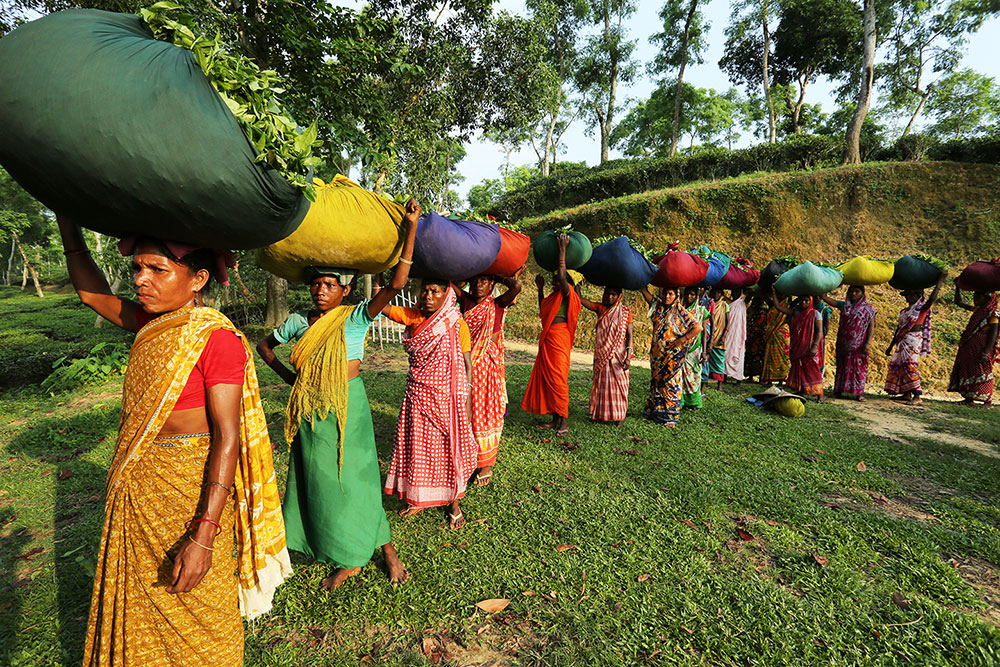
May 22, 2021 | CFLI, Dialogue Press Reports CFLI
সমকাল প্রতিবেদক | সমকাল ২২ মে, ২০২১
দেশের পিছিয়ে থাকা জনগোষ্ঠী চাশিল্পে কাজ করছেন। দীর্ঘদিনেও তাদের ভাগ্যের তেমন পরিবর্তন হয়নি। এই শ্রমিক পরিবারগুলোর খাদ্য, বাসস্থান, চিকিৎসা ও শিক্ষার ক্ষেত্রে আরও সহযোগিতা বাড়ানো জরুরি। শ্রমিকের ভাগ্যের পরিবর্তনে চাশিল্পের উন্নয়ন প্রয়োজন বলে মনে করছেন বিশেষজ্ঞরা। এ জন্য এই শিল্পের উন্নয়নে দীর্ঘমেয়াদি পরিকল্পনা নেওয়ার পরামর্শ দিয়েছেন তারা।
গতকাল শুক্রবার আন্তর্জাতিক চা দিবসে ‘চা শ্রমিকের সুরক্ষা :চ্যালেঞ্জ ও জবাবদিহিতা’ শীর্ষক এক অনলাইন সংলাপে বিশেষজ্ঞরা এসব পরামর্শ দেন। সোসাইটি ফর এনভায়রনমেন্ট অ্যান্ড হিউম্যান ডেভেলপমেন্ট (এসইএইচডি) আয়োজিত এ সংলাপে প্রধান অতিথি ছিলেন অর্থনীতিবিদ ড. ওয়াহিদ উদ্দিন মাহমুদ। তিনি বলেন, জলাবদ্ধ, আবদ্ধ এলাকার পরিবেশ ভালো হয় না। চা শ্রমিকদের সেখান থেকে আস্তে আস্তে মূলধারায় ফিরিয়ে আনতে হবে। মূলধারার সঙ্গে তাদের যোগাযোগ সৃষ্টি করতে হবে।
সাবেক তত্ত্বাবধায়ক সরকারের এই উপদেষ্টা বলেন, চা শ্রমিকদের প্রাথমিক শিক্ষা থেকে শুরু করে উচ্চশিক্ষার সুযোগ দিতে হবে। তাদের মধ্যে যাতে সম্ভাবনার দৃষ্টান্ত তৈরি হয় এবং আকাক্সক্ষা তৈরি হয়, সেজন্য বাতায়ন খুলে দিতে হবে। তিনি বলেন, চাশিল্পের লাভ-ক্ষতির ওপর শ্রমিকের সুযোগ-সুবিধা নির্ভর করবে। তাই এ শিল্পের উৎপাদনশীলতা বাড়াতে হবে। সব জায়গায় দারিদ্র্য আছে, কিন্তু নানা কারণে চা শ্রমিকরা একটি বিশেষ গোষ্ঠী হিসেবে একটি জায়গায় আবদ্ধ হয়ে আছে। তাদের মধ্যে আসল দরিদ্র কতজন, তা নিয়ে বিতর্ক আছে। বিবিএসের প্রচলিত পদ্ধতি দিয়ে, একটি বিশ্বস্ত প্রতিষ্ঠান দিয়ে এদের দারিদ্র্য ও অতিদারিদ্র্য হার জরিপ করা প্রয়োজন। কারণ, সঠিক পরিসংখ্যান ছাড়া সঠিক পদক্ষেপ নেওয়া সম্ভব নয়।
অনুষ্ঠানের সভাপতি গবেষণা সংস্থা পিপিআরসির নির্বাহী চেয়ারম্যান হোসেন জিল্লুর রহমান বলেন, চা শ্রমিকরা এ দেশের নাগরিক। তারাও মুক্তিযুদ্ধে অবদান রেখেছেন। প্রান্তিক এই জনগোষ্ঠীর স্বাস্থ্য ও শিক্ষার উন্নয়নে রাষ্ট্রের দায়িত্ব অনেক বেশি। তাদের জন্য সামাজিক সুরক্ষা বাড়ানো দরকার। চা শ্রমিকের প্রকৃত পরিসংখ্যান দরকার। যাতে সুষ্ঠু কর্মপরিকল্পনা নিয়ে এ খাতের উন্নয়ন করা সম্ভব হয়।
সংলাপে বিশেষ অতিথি শ্রম ও কর্মসংস্থান মন্ত্রণালয়ের সচিব কে. এম. আবদুস সালাম বলেন, সরকার চাশিল্পের জন্য উন্নয়ন পরিকল্পনা করছে। পাঁচ বছর মেয়াদি এ পরিকল্পনায় শ্রমিকদের কল্যাণে করণীয় নির্ধারণ করা হবে। করোনা পরিস্থিতিতে তারা সামাজিক সুরক্ষা ও স্বাস্থ্য সুরক্ষায় বেশি গুরুত্ব পাবে।
বাংলাদেশ চা সমিতির চেয়ারম্যান শাহ আলম বলেন, চা উৎপাদনে কেজিতে ২০০ টাকা খরচ হলেও বিক্রির নিশ্চিয়তা নেই। এ ক্ষেত্রে টেকসই উন্নয়ন পরিকল্পনা প্রয়োজন। কোম্পানি টিকে থাকলে শ্রমিকের সুবিধা নিশ্চিত হবে। তিনি জানান, নিলাম থেকে নির্দিষ্ট পরিমাণ টাকা দিয়ে শ্রমিক কল্যাণ তহবিল গঠন করার প্রস্তাব মন্ত্রণালয়ে দেওয়া হয়েছে। এ প্রস্তাব অনুমোদন হলে শ্রমিকদের সুযোগ-সুবিধা আরও বাড়বে।
নিজেরা করি ও বাংলাদেশের সমন্বয়ক খুশী কবির বলেন, শ্রমিকরা বৈষম্যের শিকার। তবে এখন চা স্থানীয়ভাবে বিক্রি হওয়ায় কমপ্লায়েন্স অনুসরণ করা হচ্ছে না।
শাহ্জালাল বিশ্ববিদ্যালয়ের উপাচার্য অধ্যাপক ফরিদ উদ্দিন আহমেদ বলেন, প্রান্তিক এই জনগোষ্ঠীকে মূলধারায় ফিরে আসার বিষয়টি শিক্ষার ওপর নির্ভর করছে। এ ক্ষেত্রে সংশ্নিষ্ট এলাকায় সরকার স্কুলের সংখ্যা বাড়াতে পারে। শাহ্জালাল বিশ্ববিদ্যালয় চা শ্রমিকের সন্তানদের জন্য কোটা ও বৃত্তি চালু করেছে।
মূল প্রবন্ধে এসইএইচডির পরিচালক ফিলিপ গাইন বলেন, দেশে দুই লাখ ৮৫ হাজার ১৩৯ একর জমিতে ১৫৮টি চা বাগান রয়েছে। এতে এক লাখ ৪০ হাজার ১৮৪ জন শ্রমিক বর্তমানে কাজ করেন। চা বাগানে যারা কাজ করেন, তাদের মাসিক আয় ছয় হাজার টাকা, দৈনিক আয় ২০০ টাকা। তবে এ বক্তব্যের সঙ্গে দ্বিমত পোষণ করে ফিনলে চায়ের চিফ অপারেটিং অফিসার ও বাংলাদেশ চা সংসদের শ্রমিক ওয়েলফেয়ার কমিটির আহ্বায়ক তাহসিন আহমেদ চৌধুরী বলেন, প্রতি মাসে প্রত্যেক শ্রমিকের মজুরি বাবদ নগদ টাকাসহ ১২ হাজার টাকা খরচ হয়। এ হিসাবে প্রতিদিন ৪০৩ টাকা পান শ্রমিকরা। এর বাইরে তাদের হাসপাতাল ও ওষুধ সেবা দেওয়া হয়।
বাংলাদেশ চা শ্রমিক ইউনিয়নের সাধারণ সম্পাদক রামভজন কৈরি অভিযোগ করেন, চুক্তি হলেও তা সঠিকভাবে বাস্তবায়ন না হওয়ায় শ্রমিকরা বঞ্চিত হচ্ছেন। বাংলাদেশ ট্রেড ইউনিয়ন কেন্দ্র চট্টগ্রামের সভাপতি তপন দত্ত বলেন, চা শ্রমিকরা আইনি বৈষম্যের শিকার। আইনে থাকলেও কোম্পানিগুলোর মুনাফার অংশ পান না শ্রমিকরা।
মৌলভীবাজারের জুরি ভেলী চা বাগানের শ্রমিক নেতা বাউরি বলেন, স্বাধীন দেশের অর্থনৈতিক উন্নতি করতে হলে চা শ্রমিকের জীবনমান পরিবর্তন করতে হবে।
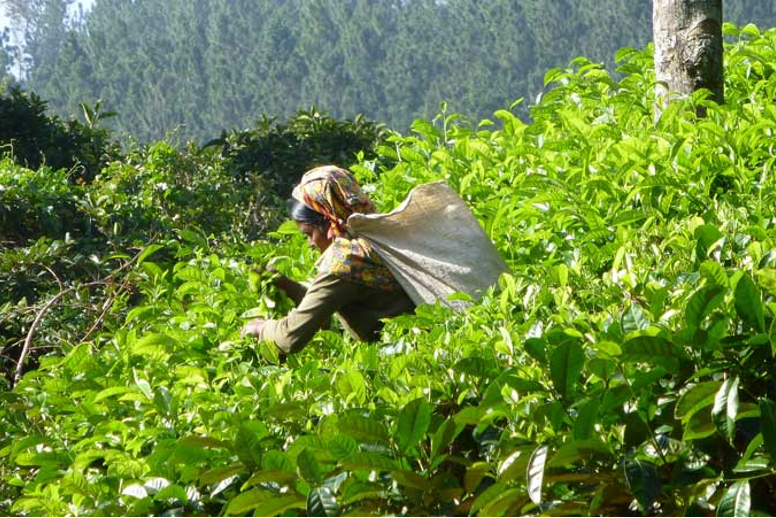
May 22, 2021 | CFLI, Dialogue Press Reports CFLI
বণিক বার্তা ২২ মে, ২০২১ | নিজস্ব প্রতিবেদক
সিলেট, মৌলভীবাজার, হবিগঞ্জ, চট্টগ্রাম ও পার্বত্য জেলার ১৫৮টি চা বাগানে ১ লাখ ৩৮ হাজার ৩৬৮ জন শ্রমিক কাজ করেন। তাদের মধ্যে ৭৪ শতাংশ শ্রমিকই দারিদ্র্যসীমার নিচে বাস করছেন। মজুরিবৈষম্যসহ বিভিন্ন বঞ্চনার কারণে এসব জনগোষ্ঠীর মানুষ অন্যান্য নাগরিকের চেয়ে এখনো অনেক পেছনে পড়ে আছে। এ অবস্থায় চা শ্রমিকদের জীবনমান উন্নয়নে সবাইকে এগিয়ে আসতে হবে। আন্তর্জাতিক চা দিবস উপলক্ষে গতকাল সোসাইটি ফর এনভায়রনমেন্ট অ্যান্ড হিউম্যান ডেভেলপমেন্টের (সেড) উদ্যোগে আয়োজিত এক ওয়েবিনারে এসব কথা বলেন বক্তারা। অনুষ্ঠানে প্রধান অতিথি ছিলেন সাবেক তত্ত্বাবধায়ক সরকারের উপদেষ্টা বিশিষ্ট অর্থনীতিবিদ অধ্যাপক ওয়াহিদউদ্দিন মাহমুদ। বিশেষ অতিথি ছিলেন শ্রম ও কর্মসংস্থান মন্ত্রণালয় সচিব কেএম আব্দুস সালাম। সম্মানীয় অতিথি ছিলেন বাংলাদেশ টি অ্যাসোসিয়েশনের (বিটিএ) চেয়ারম্যান শাহ আলম।
সাবেক তত্ত্বাবধায়ক সরকারের উপদেষ্টা ড. হোসেন জিল্লুর রহমানের সঞ্চালনায় ওয়েবিনারে মূল প্রবন্ধ উপস্থাপন করেন সেডের পরিচালক ফিলিপ গাইন। ওয়েবিনারে অন্যদের মধ্যে বক্তব্য রাখেন নিজেরা করির সমন্বয়ক খুশী কবির, শাহজালাল বিজ্ঞান ও প্রযুক্তি বিশ্ববিদ্যালয়ের উপাচার্য অধ্যাপক ফরিদ উদ্দিন আহমেদ ও ঢাকা বিশ্ববিদ্যালয়ের অধ্যাপক তমিজুদ্দিন খান। ওয়েবিনারের মিডিয়া পার্টনার ছিল বণিক বার্তা। ওয়েবিনারে চা শ্রমিকদের দারিদ্র্যের পরিসংখ্যান তুলে ধরেন আলোচকরা। তারা বলেন, মজুরিবৈষম্যসহ বিভিন্ন বঞ্চনার কারণে চা শ্রমিকরা অন্যান্য নাগরিকের চেয়ে অনেক পেছনে পড়ে আছে। বাংলাদেশ পরিসংখ্যান ব্যুরো (বিবিএস) ও ইউনিসেফের ২০১৮ সালের এক জরিপের ফলাফল অনুসারে, চা বাগানের ৭৪ শতাংশ পরিবার দারিদ্র্যসীমার নিচে বাস করে। অথচ ২০১৬ সালে জাতীয় পর্যায়ে দারিদ্র্যের হার ছিল ২৪ শতাংশ।
শ্রমিকদের মজুরিবৈষম্য নিয়ে ওয়েবিনারে উপস্থিত বাংলাদেশ চা শ্রমিক ইউনিয়নের নেতারা বলেন, চা উৎপাদনকারী দেশগুলোয় বাংলাদেশের চা শ্রমিকরা সবচেয়ে কম মজুরি পান। নগদ মজুরি ও অন্যান্য সুবিধা মিলিয়ে একজন শ্রমিকের বর্তমান দৈনিক আয় ২০০ টাকা। তবে বাগান মালিকদের সংগঠন বাংলাদেশ টি ওনার্স অ্যাসোসিয়েশনের (বিটিএ) হিসাবে একজন শ্রমিকের দৈনিক মজুরি ২৭০ টাকা। এক হিসাব অনুযায়ী, যেসব শ্রমিক মাঠ পর্যায়ে কাজ করেন, তাদের দৈনিক মজুরি ৩৮৯ টাকা। যারা কারখানায় কাজ করেন তারা পান ৩৪৭ টাকা। তবে মালিকপক্ষের এ দাবিকে কোনোভাবেই মানতে রাজি নন বাংলাদেশ চা শ্রমিক ইউনিয়নের (বিসিএসইউ) সাধারণ সম্পাদক রামভজন কৈরী। তিনি বলেন, একজন চা শ্রমিক যে মজুরি পান তা কোনোভাবেই ন্যায্য মজুরির ধারেকাছেও পড়ে না।
করোনাকালীন সময়ে চা শ্রমিকদের দুর্বিষহ জীবনের বিষয়টি তুলে ধরে বক্তারা বলেন, সুরক্ষামাগ্রী-মাস্ক, হ্যান্ডস্যানিটাইজার, কভিড-১৯ পরীক্ষার সুযোগ, ছুটি এবং অনুদান এক কথায় কিছুই পায়নি চা শ্রমিকরা। পাঁচ প্রজন্ম ধরে চা শ্রমিকরা একই পেশায় যুক্ত আছেন। এদের নেই কোনো নিজস্ব জমি, ভিটা বা বাড়ি। এসব শ্রমিক বাগান মালিক ও রাষ্ট্রের ওপর নির্ভরশীল জীবনযাপন করছে। অধিকাংশ শ্রমিকই বেতনবৈষম্যের শিকার। এমনকি কভিডকালেও চা শ্রমিকরা কোনো সুযোগ-সুবিধা পাননি। করোনা পরীক্ষা কিংবা করোনাকালীন ছুটিও এদের ভাগ্যে জোটেনি। অনুদান তো দূরের কথা, কভিড থেকে নিরাপদ থাকতে সুরক্ষাসামগ্রীও তারা পাননি।
ওয়েবিনারে বলা হয়, বাংলাদেশের চা বাগানে কর্মরত শ্রমিকদের অধিকাংশই অবাঙালি। শ্রীলংকার চা বাগানে কর্মরত শ্রমিকদের সঙ্গে বাংলাদেশের চা শ্রমিকদের পার্থক্য হলো, শ্রীলংকার সব চা শ্রমিক তামিল। কিন্তু বাংলাদেশের চা শ্রমিকদের জাতি পরিচয় খুবই বৈচিত্রপূর্ণ। সেডের তথ্য অনুযায়ী, ২০১৩ থেকে ২০১৫ সালের মধ্যে ১৫৬টি চা বাগানে গবেষণা চালিয়ে দেখা যায়, অন্তত ৮০টি ক্ষুদ্র জাতিগোষ্ঠী চা শ্রমিক হিসেবে কর্মরত আছে। এর মধ্যে ২০১৯ সালে সরকার ক্ষুদ্র নৃ-গোষ্ঠীর সংশোধিত তালিকায় ২৩টি জাতিগোষ্ঠীকে নথিভুক্ত করা হয়।
বৈচিত্র্যপূর্ণ চা শ্রমিকদের মধ্যে এখনো ১২টি ভাষা টিকে আছে। যদিও অধিকাংশ পরিপূর্ণ ভাষার মর্যাদা হারিয়ে ফেলেছে। নানা ভাষা ও সংস্কৃতির ধারক চা শ্রমিকদের পরিবার আধুনিক জীবনধারা থেকে পিছিয়ে আছে মন্তব্য করে বক্তারা বলেন, দুঃখজনকভাবে চা শ্রমিক ও তাদের পরিবার চা বাগানেই আটকে আছেন। চা শ্রমিকরা বাংলাদেশের নাগরিক। তারা যেকোনো জায়গায় যেতে পারেন। যেকোনো স্থানে বসবাস করার অধিকারও তাদের আছে। কিন্তু তারা বংশ পরম্পরায় চা বাগানে যুক্ত হয়ে আছেন।
চা শ্রমিকের আবাসন, স্বাস্থ্য ও শিক্ষা লাভের সুযোগের বিষয়ে গুরুত্বারোপ করে বক্তারা বলেন, তাদের বসবাসের ব্যবস্থা করার দায়িত্ব বাগান মালিকের। এ ব্যাপারে বাংলাদেশ শ্রম বিধিমালা ২০১৫-এর পঞ্চম তফসিলে সুনির্দিষ্ট নির্দেশনা দেয়া আছে। শুধু তা-ই নয়, ঘর মেরামতের দায়িত্বও বাগান মালিকের। চা শ্রমিকরা বাগান মালিকের দেয়া গৃহের ব্যাপারে সন্তুষ্ট নন। বাংলাদেশ টি বোর্ডের ২০১৯ সালের পরিসংখ্যান অনুসারে, চা বাগানে পাকা ঘরের সংখ্যা ১৮ হাজার ৪৯০। আর কাঁচা ঘরের সংখ্যা ৫৭ হাজার ৫৯। এ অবস্থা আইনের সুস্পষ্ট লঙ্ঘন। গৃহ নিয়ে আরো নানা উদ্বেগ আছে। শ্রম আইনে যেসবের মীমাংসা হওয়া দরকার।
ওয়েবিনারে বলা হয়, চা বাগানগুলোয় বাগান ব্যবস্থাপনায় পরিচালিত হাসপাতাল ও ডিসপেনসারি আছে। কিন্তু এসব হাসপাতালে যে চিকিৎসা পাওয়া যায়, তাতে শ্রমিকরা সন্তুষ্ট নন। ক্যান্সার, যক্ষ্মাসহ বড় কোনো রোগে পড়লে বাগানের হাসপাতাল ও ডিসপেনসারিতে ভালো চিকিৎসা মেলে না। শ্রম আইন ও বিধিমালায় যেসব প্রসূতি কল্যাণ সুবিধা এবং অন্য সুযোগ-সুবিধা চা শ্রমিক ও তাদের পরিবারের পাওয়ার কথা, তার অনেক কিছুই তারা পান না। তবে চা বাগানের কাছাকাছি যেসব সরকারি স্বাস্থ্য সেবাদানকারী প্রতিষ্ঠান আছে, সেখানে চা শ্রমিকদের যেতে বাধা নেই। তাদের কেউ কেউ সেখানে যাচ্ছেনও। সংগত কারণেই তাদের সংখ্যা কম।
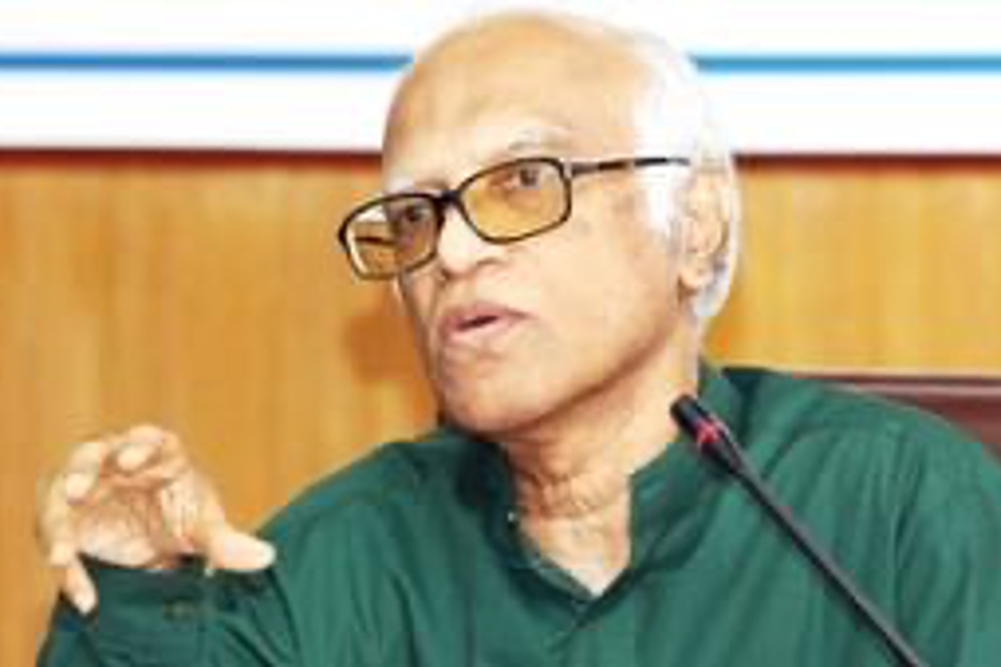
May 22, 2021 | CFLI, Dialogue Press Reports CFLI
প্রথম আলো ২২ মে, ২০২১
অর্থনীতিবিদ ওয়াহিদউদ্দিন মাহমুদ প্রথম আলো ফাইল ছবি
বিশিষ্ট অর্থনীতিবিদ অধ্যাপক ওয়াহিদউদ্দিন মাহমুদ বলেছেন, আকাক্সক্ষা অর্থনীতির একটি উপাদান। দেশের চা-শ্রমিকদের মধ্যে আকাক্সক্ষার সৃষ্টি করতে হবে। তাঁরা যেন নিজেদের ভাগ্যবিড়ম্বিত বলে মনে না করেন। চা-শ্রমিকদের মূলধারার জনগোষ্ঠী থেকে বিচ্ছিন্ন রাখা যাবে না। এতে এ শিল্পের বিকাশ রুদ্ধ হবে।
আন্তর্জাতিক চা দিবস উপলক্ষে এক র্ভাচ্যুয়াল সভায় এ কথা বলেন ওয়াহিদউদ্দিন মাহমুদ। আজ শুক্রবার সকালে এ সভার আয়োজন করে বেসরকারি সংগঠন সোসাইটি ফর এনভায়রনমেন্ট অ্যান্ড হিউম্যান ডেভেলপমেন্ট (সেড)। আজকের সভায় চা-শ্রমিক, চা-বাগানের মালিকপক্ষ, সরকারের শ্রম মন্ত্রণালয়ের প্রতিনিধিসহ বিভিন্ন শ্রেণি-পেশার মানুষ অংশ নেন। চা-শিল্পের সঙ্গে জড়িত প্রতিটি খাতের প্রতিনিধিদের আলোচনায় অনুষ্ঠান প্রাণবন্ত হয়ে ওঠে। অনুষ্ঠানের প্রধান অতিথি ওয়াহিদউদ্দিন মাহমুদ বলেন, চা-শ্রমিকেরা প্রান্তিক জনগোষ্ঠী। কিন্তু দেশের অন্য প্রান্তিক গোষ্ঠীর সঙ্গে তাঁদের ভিন্নতা আছে। জাতিসত্তা, ভাষা ইত্যাদি নানা নিরিখে চা জনগোষ্ঠীর মানুষদের সঙ্গে মূলধারার মানুষের ভিন্নতা রয়েছে। আর এসব ভিন্নতা তাঁদের অনেকটা বিচ্ছিন্ন করে রেখেছে। এ বিচ্ছিন্নতাকে তাঁদের প্রান্তিকতার বড় কারণ। এখান থেকে তাঁদের বের করে আনতে হবে।
ঢাকা বিশ্ববিদ্যালয়ের অর্থনীতির অধ্যাপক ওয়াহিদউদ্দিন মাহমুদ বলেন, চা দেশের গুরুত্বপূর্ণ অর্থনৈতিক খাত। এ শিল্পকে নিয়ে সামগ্রিকভাবে ভাবতে হবে। এখানে শ্রমিকের স্বার্থ যেমন দেখতে হবে, তেমন মালিকের স্বার্থও বিবেচনায় নিতে হবে। শিল্পের বিকাশে মালিক, শ্রমিক ও সরকারের মিলিত সমঝোতা দরকার। অনুষ্ঠানে সভাপতিত্ব করেন সাবেক তত্ত্বাবধায়ক সরকারের উপদেষ্টা হোসেন জিল্লুর রহমান। তিনি বলেন, করোনা মহামারির এ সময়ে অভ্যন্তরীণ অর্থনীতির বিকাশে জোর দেওয়া হচ্ছে। অভ্যন্তরীণ অর্থনীতির অন্যতম খাত চা-শিল্প। এ সংকটকালে এ শিল্পের উৎপাদন সচল রাখা জরুরি। আর মালিক ও শ্রমিক উভয় পক্ষের পারস্পরিক সংলাপ ও সহযোগিতায় এটা সম্ভব।
অর্থনীতিবিদ হোসেন জিল্লুর বলেন, চা জনগোষ্ঠীর মানুষের দারিদ্র্য, তাঁদের আয়, তাঁদের পেছনে মালিকের ব্যয়-এসব বিষয়ে উন্নততর ও গ্রহণযোগ্য পরিসংখ্যান দরকার। চা-শিল্পের অর্থনীতির দিকটির উন্নতির পাশাপাশি শ্রমিকদের সামাজিক ন্যায়বিচারের বিষয়টি নিশ্চিত করতে হবে। অনুষ্ঠানে সেডের পরিচালক ফিলিপ গাইন ‘চা-শ্রমিকের সুরক্ষা: চ্যালেঞ্জ ও জবাবদিহিতা’ শীর্ষক মূল প্রবন্ধ পড়েন। প্রবন্ধে বাংলাদেশের চা-শিল্পের বর্তমান অবস্থা, শ্রমিকের মজুরি, শিক্ষা, স্বাস্থ্য ও শ্রম আইনের নানা দিক তুলে ধরা হয়।
অনুষ্ঠানে শ্রম ও কর্মসংস্থান মন্ত্রণালয়ের সচিব কে এম আবদুস সালাম চা-শিল্প নিয়ে পাঁচ বছর মেয়াদি একটি কর্মপরিকল্পনা তৈরির ঘোষণা দেন। অনুষ্ঠানে চা-বাগানের মালিকদের প্রতিষ্ঠান বাংলাদেশি চা সংসদের চেয়ারম্যান এম শাহ আলম বলেন, ‘চা-শিল্পে মালিক-শ্রমিকের সম্পর্ক ভালো। শ্রমিকদের ছাড়া আমরা চলতে পারব না। চা-কৃষি ও শিল্পের একটি মিলিত রূপ। এ শিল্পে ওঠানামা আছে।’
অনুষ্ঠানে চা সংসদের লেবার অ্যান্ড ওয়েলফেরার কমিটির আহ্বায়ক তাহসিন এ চৌধুরী বলেন, এখন চা-শ্রমিকের দৈনিক মজুরি ১২০ টাকা হলেও আসলে প্রতিদিন শ্রমিক প্রতি মালিকের ব্যয় ৪০০ টাকা। মাসে শ্রমিকের পেছনে ১২ হাজার টাকা ব্যয় হয়। তবে তাহসিন চৌধুরীর সঙ্গে ভিন্নমত পোষণ করেন বাংলাদেশ চা শ্রমিক ইউনিয়নের সাধারণ সম্পাদক রামভজন কৈরি। তিনি বলেন, এ ব্যয় ২০০ টাকার বেশি হবে না। রামভজন কৈরী শ্রম আইনে চা-শ্রমিকদের স্বার্থবিরোধী ধারাগুলোর বিলোপ দাবি করেন। অনুষ্ঠানে আরও বক্তব্য দেন মানবাধিকার কর্মী খুশী কবির, শাহজালাল বিজ্ঞান ও প্রযুক্তি বিশ্ববিদ্যালয়ের উপাচার্য ফরিদ উদ্দিন আহমেদ, প্রবীণ শ্রমিকনেতা তপন দত্ত, ঢাকা বিশ্ববিদ্যালয়ের আন্তর্জাতিক সম্পর্ক বিভাগের অধ্যাপক তানজিমউদ্দিন খান, জুড়ি ভ্যালির চা-শ্রমিক শ্রীমতি বাউরি প্রমুখ।
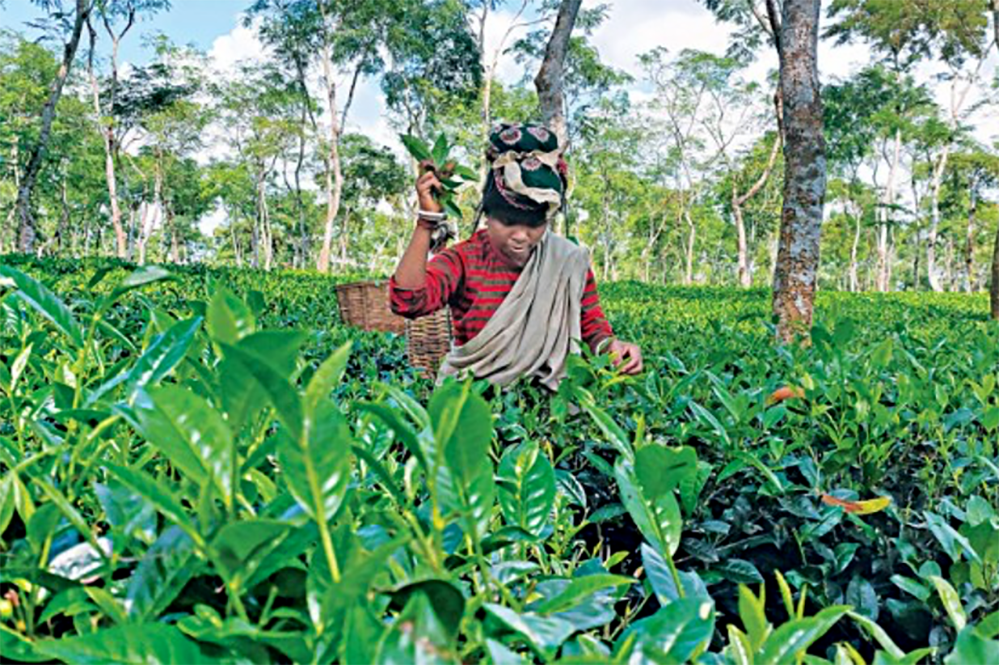
May 22, 2021 | CFLI, Dialogue Press Reports CFLI
The Daily Star | May 22, 2021
Speakers suggest integrating tea workers into mainstream; International Tea Day observed
A worker collects tea leaves at a garden in Habiganj. Photo: Star/ Star Reort
“There is poverty in every sector, but tea workers suffer the most as they’re geographically confined due to several reasons. They must be integrated into the mainstream,” said Prof Wahiduddin Mahmud, an eminent economist, yesterday.
He was speaking as chief guest at a discussion titled “Protection of Tea Workers: Challenges and Accountability of Actors.” The virtual discussion marking International Tea Day was organised by Society for Environment and Human Development (SEHD) in partnership with Bangladesh Cha Sramik Union. It was supported by Canada Fund for Local Initiative.
Prof Wahiduddin said, “Workers of other sectors are part of the common society. But the isolation of tea workers leaves them particularly deprived.” “The tea industry is mostly private and relies on productivity and profit, which must be increased at all times. During negotiation of wages and other terms, these business owners should be transparent,” he said.
He urged Bangladesh Bureau of Statistics to prepare a statistical report on the industry that will assist policies. Philip Gain, director of SEHD, presented the keynote paper while Dr Hossain Zillur Rahman, executive chairman of Power and Participation Research Centre (PPRC), chaired and facilitated the dialogue.
In the keynote paper, Gain mentioned tea workers are being deprived by the labour law, while women workers are suffering the most. They have substandard quality of living and there is a lack of health and education facility, he said. He also mentioned in the paper that the tea workers have no right to land and are not able to get the benefits of the government’s social safety services.
Gain also stated that the wage of tea workers in cash is Tk 120 per day along with ration and other facilities. Workers say the value of these facilities and ration is Tk 200. So their total wage comes to Tk 320, he said. But Bangladesh Tea Association estimated that to be Tk 378.91 in a report to Wage Board in 2019, he said.
KM Abdus Salam, secretary of the Ministry of Labour and Employment; M Shah Alam, chairman of Bangladesh Tea Association (BTA); Khushi Kabir, coordinator of Nijera Kori, and Prof Farid Uddin Ahmed, VC of Shahjalal University of Science and Technology, were present as guests of honour.
Leaders of Cha Sramik Union and Trade Union Centre also participated as discussants. Tahsin Choudhury, convener of labour and welfare sub-committee of BTA, also participated. Prof Tanzimuddin Khan of Dhaka University and member of SEHD gave the vote of thanks.
https://www.thedailystar.net/city/news/isolation-leaves-them-deprived-2096453
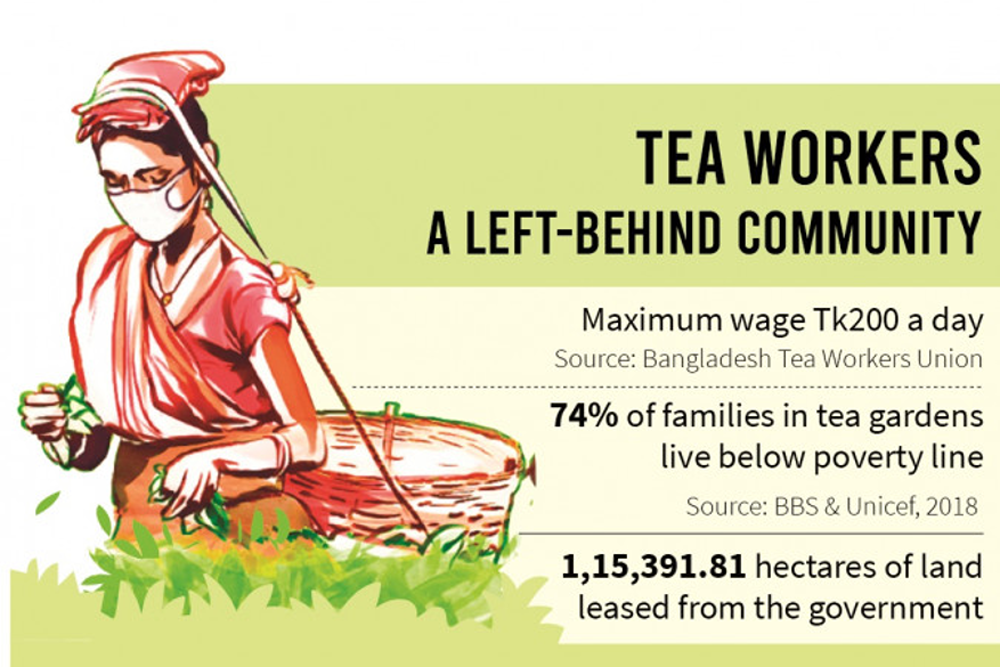
May 22, 2021 | CFLI, Dialogue Press Reports CFLI
Business Standard | FE Report | 22 May 2021
International Tea Day was observed in the country like elsewhere in the world on 21 May
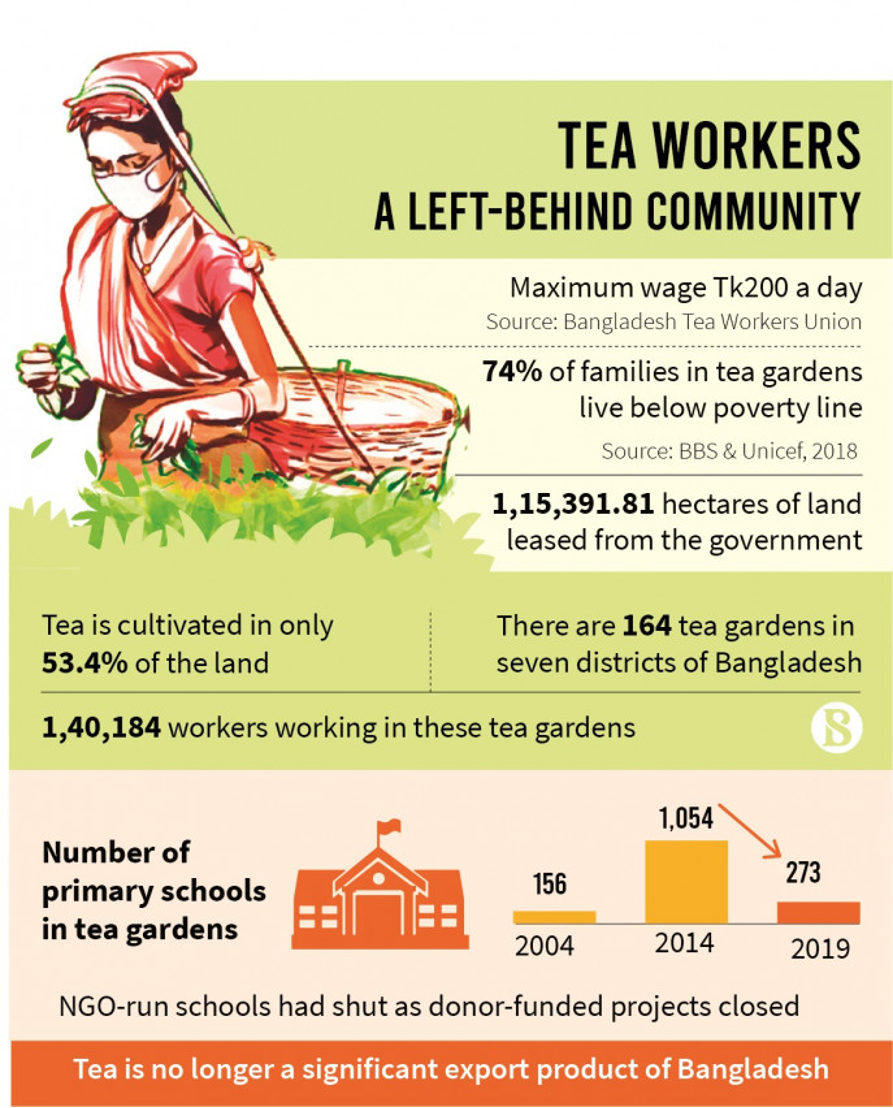 Economists and experts have asked for increasing social protection for tea workers to restore the tea industry to a strong position on the list of export-oriented sectors. They recommended that the government formulate a plan attaching priority to issues like education and health for the tea garden labourers and their children.
Economists and experts have asked for increasing social protection for tea workers to restore the tea industry to a strong position on the list of export-oriented sectors. They recommended that the government formulate a plan attaching priority to issues like education and health for the tea garden labourers and their children.
Tea garden workers were once considered slaves, but even though that situation has changed, these workers are still socially isolated, Economist Professor Wahiduddin Mahmud said in a webinar entitled “Tea workers of Bangladesh: challenges and accountability of actors” organised on the occasion of International Tea Day on Friday.
“We have to create opportunities for them. Aspiration must be awakened in them so that they can dream of becoming accomplished in society. To this end, a congenial environment must be created for their education. The scope of social protection should be increased,” Prof Wahiduddin said.
Concerted efforts by the government, the owners and NGOs will yield good results in this regard, he observed. “But, now we have to think about the whole industry. We have to think about how the productivity of this industry can be increased so that the industry can have a greater share of the international tea market apart from that of the domestic market,” he added. Dr Hossain Zillur Rahman, executive chairman of the Power and Participation Research Centre (PPRC), said tea was once at the forefront of our export products but it has lost that position.
He, however, observed that the domestic market has been strong, which is a very good thing. “But, since there is a good market for this product outside the country, exports will increase again if workers are protected by giving importance to compliance issues. That will add pace to our overall economic growth,” Dr Hossain Zillur said. Tea workers have now been brought under civic amenities, but their basic needs like education and health have not been fully ensured, he pointed out. “For this, we have to give importance to accurate statistics. The solution will come, if all the stakeholders plan together on the basis of factual information.”
In the keynote presentation, Philip Gain, director of the Society for Environment and Human Development (SEHD), highlighted various sorts of discrimination tea workers in the country face. When the number of casual leaves in other industries is 10 days, that is not the case in the tea industry, he said. There is also inequality in earned leaves, he said, adding that workers in other industries receive one day of earned leave every 18 work days, but for tea workers it is one day for every 22 days of work.
He went on to say that recruitments in the sector are not done through issuing appointment letters, flouting the labour law.
Temporary workers usually do not receive full rations, medical care and paid leave. While companies are supposed to distribute 5% of their profits among workers, they seldom give it. Workers receive a small pension at the end of their employment, but do not receive gratuity, Philip further added.
Citing a 2018 survey by the Bangladesh Bureau of Statistics (BBS) and Unicef, he said 74% of tea garden families lived below the poverty line. But in 2016, this rate was 24% at the national level. He also mentioned that tea workers are deprived of education and health. He said as per the 2004 census, the number of primary schools in 156 tea gardens in the country was 188. The number is 273, according to the statistics of 2019.
In 2014, the number of primary schools in tea gardens reached 1,054. At that time, non-government organisation Brac alone operated 789 primary schools in tea gardens but those are closed at present. Philip demanded that an adequate number of quality government schools be established and education opportunities be ensured there through the introduction of a quota system for the workers.
Professor Farid Uddin Ahmed, vice chancellor of Shahjalal University of Science and Technology (SUST), told the event, “As the first university in the country, we have introduced a quota to build tea workers’ children as first-class citizens. At present, 12 such students are studying in our university.”
Other local institutions in Sylhet may follow suit, he said. He, however, advised to focus on value addition to increase the tea sector’s reach in the international market. Addressing the programme as chief guest, KM Abdus Salam, secretary to the Ministry of Labour and Employment, said the government’s social safety net programme is giving priority to improving the quality of life of tea workers. “We want to take up a 5-year plan to this end. This requires your participation.”
Khushi Kabir, coordinator of Nijera Kori, said the maternity leave for women tea workers is 16 weeks, but it is 24 weeks for those in other industries. She called for the elimination of this inequality. M Shah Alam, chairman of Bangladesh Tea Association (BTA), said an initiative is underway to set up a combined fund with regard to the issue of 5% profit sharing. “This is being done so that there is no discrimination against the workers, as profits are not equal in all organisations.”
Tapan Datta, president of Bangladesh Trade Union Centre (Chattogram), mentioned that in 1921, owners used to beat workers by tying them up. “Even though that is not the case now, workers are still deprived of basic rights like education and health.” He also questioned the decision to keep the gardens open and indifference to protecting the health of workers amid the coronavirus pandemic.
https://www.tbsnews.net/economy/industry/improve-workers-life-revive-tea-export-experts-248968
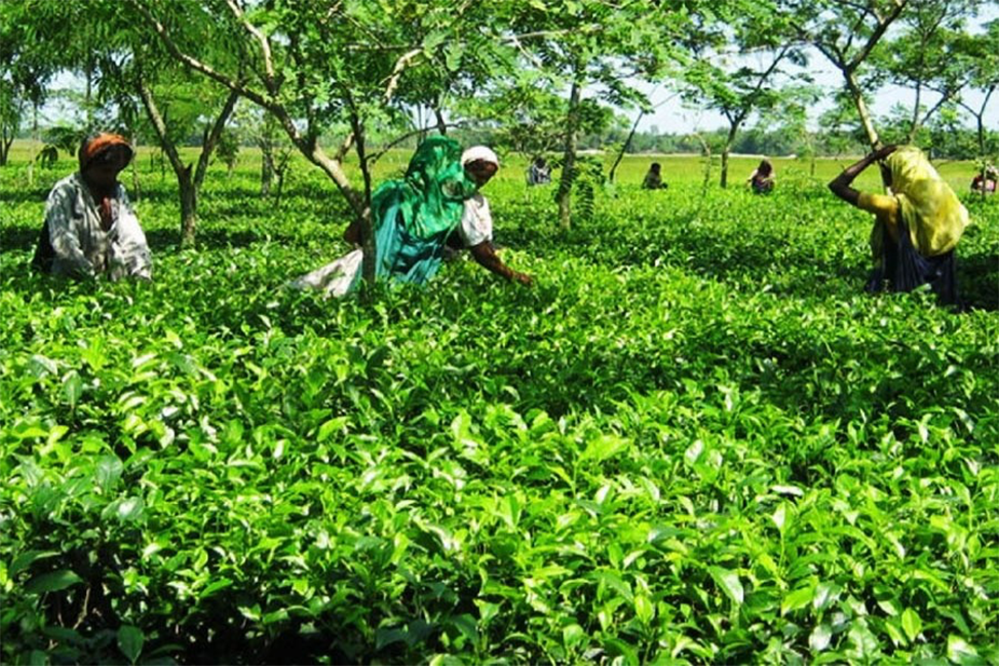
May 22, 2021 | CFLI, Dialogue Press Reports CFLI
Financial Express | FE REPORT | Published: May 22, 2021 09:53:01
Speakers at a virtual discussion on Friday laid emphasis on involving the tea workers in the mainstream society, enhancing their access to education and healthcare services for improving their living standard. They also suggested preparing a plan of actions for these workers and involving them with the process to review law related to labour rights.
The recommendations were made at a webinar titled ‘Protection of Tea Workers: Challenges and Accountability of Actors’ organised by Society for Environment and Human Development (SEHD) in partnership with Bangladesh Cha Sramik Union (BCSU) and with support from Canada Fund for Local Initiatives (CFLI) of the Canadian government marking International Tea Day.
Eminent economist Prof Wahiduddin Mahmud took part in the virtual event as the chief guest while Labour and Employment Secretary K M Abdus Salam as the special guest. Chaired by noted economist and chairman of BRAC Bangladesh Dr Hossain Zillur Rahman, the programme was attended by Bangladesh Tea Association (BTA) Chairman M Shah Alam as a guest of honour.
Representatives from owners, trade unions, academics and government officials and rights activists also took part in the discussion. Speaking on the occasion, Prof Wahiduddin Mahmud placed emphasis on including the tea workers in the mainstream society as they are secluded from other parts of the society and they remain unattended.
“Difficult it is, there should be effort to involve the tea workers in the mainstream society to improve their living standard gradually,” said the economist. He suggested conducting a dedicated survey to understand the level of poverty among the tea workers to provide them support under the government’s social safety net programmes. He also emphasised the importance of increasing productivity, education and healthcare services for the tea estate workers and their children.
“Increase in productivity of tea is desired but the calculation of profit and loss in the tea sector should be accurate for the workers to negotiate with the owners for their legitimate rights and benefits,” Prof Mahmud added. Mr Salam said a whole-of-government approach should be in place to solve issues related to workers’ welfare. He also stressed the need for preparing a sector-specific five-year plan in this regard. Mr Hossain Zillur Rahman suggested that the economists get involved in the calculation of what the tea workers actually get.
“The culture and languages of different ethnic communities in the tea gardens should also be protected,” said Dr Rahman. Philip Gain, director at SEHD, presented a keynote paper. According to it, some 138,367 workers are employed at 158 tea estates excluding eight gardens in Panchagarh and Thakurgaon. Tea workers get only Tk 120 per day as per owner and worker’s latest agreement.
“The extent of discrimination and deprivation is reflected in the wages earned by the tea workers,” the paper reads. Representatives of estate owners said the workers get a good amount of different in-kind benefits besides cash benefit as per the agreement. Mr Shah Alam said unlike other businesses, tea estate owners have to consider versatile issues including workers’ welfare, crop production and profitability. “We look at them (workers) as our asset, as we cannot operate without their support,” he said. The tea workers receive a good amount of in-kind benefit from the owners in addition to in-cash benefit, he added. Rambhajan Kairi, General Secretary of Bangladesh Cha Sramik Union (BCSU), said tea workers are no way involved with the process of law amendment. “I would request the authorities concerned to involve the tea workers while any changes are brought to related labour laws to make them really meaningful for us,” said Mr Kairi.
saif.febd@gmail.com
https://thefinancialexpress.com.bd/trade/call-to-involve-tea-workers-in-mainstream-society-1621655581?amp=true






 Economists and experts have asked for increasing social protection for tea workers to restore the tea industry to a strong position on the list of export-oriented sectors. They recommended that the government formulate a plan attaching priority to issues like education and health for the tea garden labourers and their children.
Economists and experts have asked for increasing social protection for tea workers to restore the tea industry to a strong position on the list of export-oriented sectors. They recommended that the government formulate a plan attaching priority to issues like education and health for the tea garden labourers and their children.